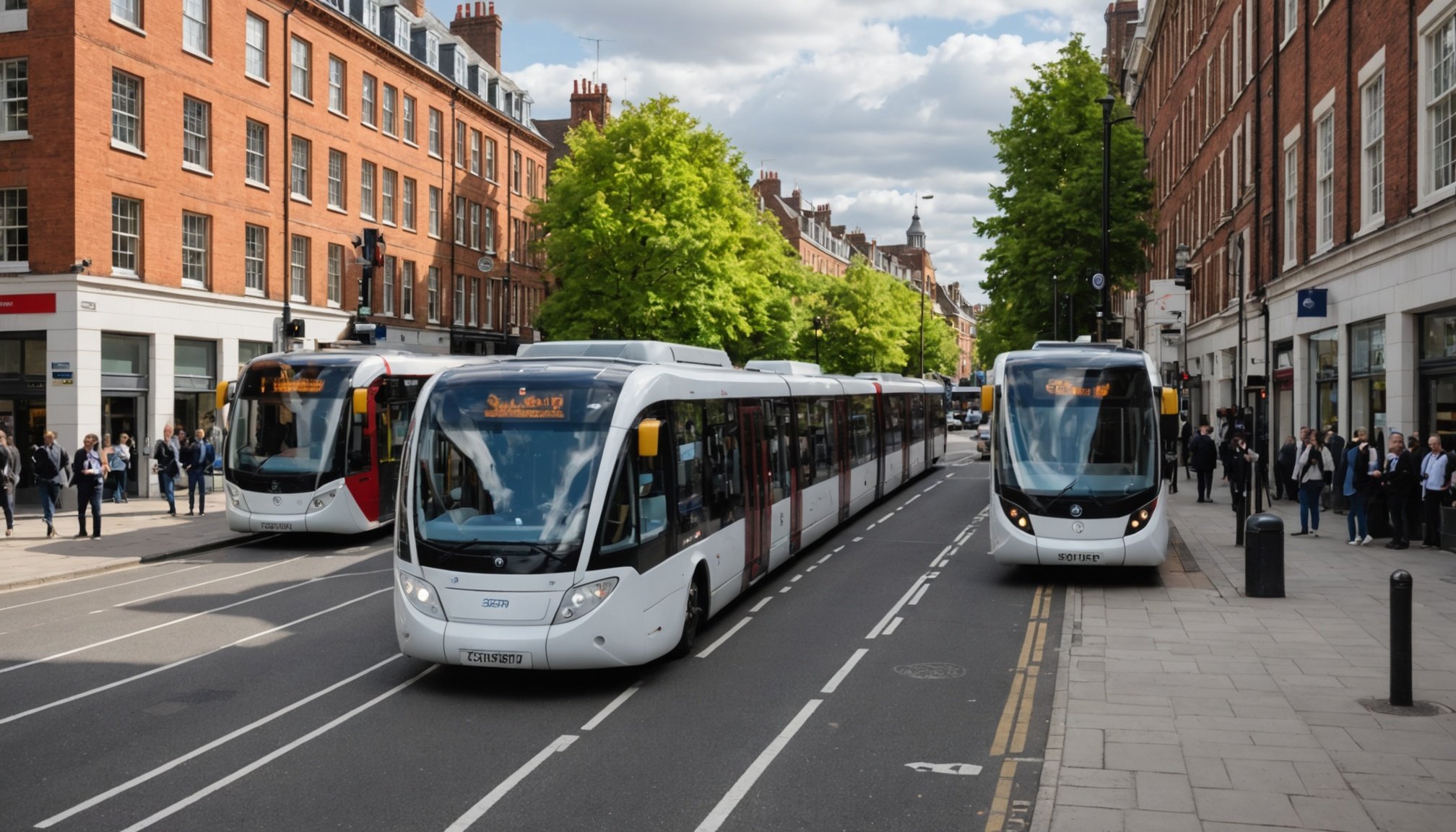Transforming Urban Mobility: Exploring the Benefits of Smart Transportation Technologies in UK Cities to Smart Transportation
In the bustling cities of the UK, the need for efficient, sustainable, and innovative transportation solutions has never been more pressing. The integration of smart transportation technologies is revolutionizing urban mobility, making cities more livable, sustainable, and connected. This article delves into the benefits, applications, and future of smart transportation in UK cities.
The Role of IoT in Smart Cities
The Internet of Things (IoT) is a cornerstone of smart city infrastructure, particularly in the realm of transportation. IoT devices and sensors are being used to streamline services, enhance residents’ lives, and create more sustainable urban environments.
Also read : Revolutionary strategies driving carbon reduction in the uk building sector
Smart Traffic Management Systems
One of the most significant applications of IoT in urban mobility is smart traffic management. Cities like Darmstadt have deployed intelligent traffic sensors to monitor and control traffic flow dynamically. These sensors evaluate traffic in real time, allowing for adaptive signal changes that reduce wait times and improve overall traffic movement. For instance, in the UK, similar systems could be implemented to mitigate rush hour congestion in cities like London or Manchester, significantly reducing travel times and emissions[4].
Intelligent Public Transportation Networks
IoT is also transforming public transportation networks. In cities like Seoul, South Korea, IoT devices are used for real-time tracking of vehicles, smart ticketing systems, and even climate-controlled subways. These innovations can be replicated in UK cities to enhance the efficiency and comfort of public transport. For example, integrating IoT into the London Underground could provide real-time updates, optimize train schedules, and improve passenger satisfaction.
Also to see : Unveiling the impact of ai innovations on predictive policing in the uk
Quantum Technologies: The Future of Transportation
Quantum technologies are on the horizon, promising to revolutionize various aspects of transportation, including traffic optimization, cybersecurity, and precise navigation.
Quantum Computing and Traffic Optimization
Quantum computers can process exponentially larger datasets than classical computers, which could fundamentally change how transport systems handle complex optimization problems. A simulation by Fujitsu suggests that quantum-enabled traffic management systems could reduce travel times by 40%, saving the UK up to £2.8 billion annually in congestion costs[2].
Quantum Sensing and Safety
Quantum sensing technologies, such as quantum gravimeters and inertial navigation systems, can enhance safety and efficiency. These sensors can detect underground voids, prevent accidental strikes during construction, and offer reliable positioning in GPS-denied environments like tunnels or urban canyons. This could be particularly beneficial for maintaining railway tracks and ensuring the safety of autonomous vehicles in UK cities.
Addressing Rural Transport Challenges
While smart transportation technologies are often associated with urban areas, they also hold significant potential for improving mobility in rural regions.
The Rural Transport Accelerator Fund
The UK government has launched the Rural Transport Accelerator Fund, providing £1.2 million to support innovative transport solutions in rural areas. Eight projects, each awarded £150,000, are focused on using the latest innovations to better connect rural communities. These projects include digital tools to predict rural transport demand, journey mapping tools to support health providers, and even the use of recycled car tires for safer cycling infrastructure[1][3][5].
Key Benefits of Smart Transportation Technologies
Enhanced Mobility and Connectivity
Smart transportation technologies are designed to improve the overall mobility and connectivity within cities. Here are some key benefits:
- Real-Time Information: IoT sensors and smart systems provide real-time updates on traffic, public transport schedules, and road conditions, helping people plan their journeys more efficiently.
- Reduced Congestion: Adaptive traffic management and optimized public transport systems can significantly reduce congestion, saving time and lowering emissions.
- Increased Safety: Quantum sensing and IoT technologies can enhance safety by detecting potential hazards and improving navigation in challenging environments.
Sustainable Urban Development
Smart transportation is a crucial component of sustainable urban development.
- Environmental Impact: By optimizing traffic flow and promoting public transport, smart transportation systems can reduce emissions and contribute to a cleaner environment.
- Resource Efficiency: Smart traffic management and public transport systems can reduce the need for personal vehicles, thereby conserving resources and reducing urban sprawl.
Economic Benefits
The economic benefits of smart transportation technologies are substantial.
- Cost Savings: Reducing congestion and improving logistics can save billions annually. For example, quantum-enabled traffic management could save the UK up to £2.8 billion in congestion costs by 2035[2].
- Job Creation and Local Economies: Initiatives like the Rural Transport Accelerator Fund support rural jobs and kickstart local economies by improving connectivity and access to services.
Practical Insights and Actionable Advice
For cities looking to implement smart transportation technologies, here are some practical insights and actionable advice:
Collaborate with Innovators
- Partner with innovative companies and startups to leverage the latest technologies. For instance, the Rural Transport Accelerator Fund collaborates with small businesses to develop innovative transport solutions[1][3][5].
Invest in IoT Infrastructure
- Invest in IoT infrastructure to gather and analyze data. This data can be used to make informed decisions about traffic management, public transport optimization, and urban planning[4].
Embrace Quantum Technologies
- Start exploring the potential of quantum technologies. While these technologies are still in development, they offer transformative potential for future transportation systems[2].
Examples and Case Studies
Darmstadt’s Smart Traffic Sensors
Darmstadt’s use of intelligent traffic sensors is a prime example of how IoT can mitigate rush hour congestion. By dynamically adjusting traffic signals based on real-time data, the city has significantly reduced wait times and improved overall traffic flow[4].
London’s Smart Bus Network
London is integrating IoT into its bus network to provide real-time updates and optimize bus schedules. This initiative aims to improve passenger satisfaction and reduce travel times, making public transport a more appealing option.
The transformation of urban mobility through smart transportation technologies is a multifaceted and ongoing process. From the use of IoT in traffic management and public transport to the promising future of quantum technologies, these innovations are set to make UK cities more sustainable, efficient, and connected.
As Future of Roads Minister Lilian Greenwood noted, “People who live in rural areas have unique needs when it comes to transport, and we’re always looking for ways to improve connections across the country.” This sentiment applies equally to urban areas, where smart transportation technologies are revolutionizing the way people live, work, and travel.
By embracing these technologies and collaborating with innovators, the UK can create smarter, more sustainable cities that enhance the quality of life for all residents.
Table: Comparing Smart Transportation Technologies
| Technology | Application | Benefits | Examples |
|---|---|---|---|
| IoT Sensors | Traffic Management | Real-time updates, reduced congestion | Darmstadt, London |
| Quantum Computing | Traffic Optimization | Reduced travel times, cost savings | UK Simulation by Fujitsu |
| Quantum Sensing | Safety and Navigation | Enhanced safety, reliable positioning | Railway maintenance, autonomous vehicles |
| Smart Public Transport | Real-time tracking, smart ticketing | Improved efficiency, passenger satisfaction | Seoul, South Korea |
| Rural Transport Accelerator Fund | Rural Transport Solutions | Improved connectivity, job creation | UK Rural Areas |
Detailed Bullet Point List: Key Features of Smart Transportation Systems
- Real-Time Data: IoT sensors provide real-time updates on traffic, road conditions, and public transport schedules.
- Adaptive Traffic Management: Dynamic adjustment of traffic signals based on real-time data to reduce congestion.
- Optimized Public Transport: Real-time tracking and smart ticketing systems to improve efficiency and passenger satisfaction.
- Quantum Optimization: Use of quantum computers to solve complex optimization problems, reducing travel times and costs.
- Enhanced Safety: Quantum sensing technologies to detect potential hazards and improve navigation.
- Sustainable Development: Reduction in emissions and resource conservation through optimized traffic flow and public transport.
- Economic Benefits: Cost savings through reduced congestion and improved logistics, job creation and local economic growth.
- Collaboration with Innovators: Partnership with startups and small businesses to leverage the latest technologies.
- Investment in IoT Infrastructure: Gathering and analyzing data to make informed decisions about urban planning and transportation.






